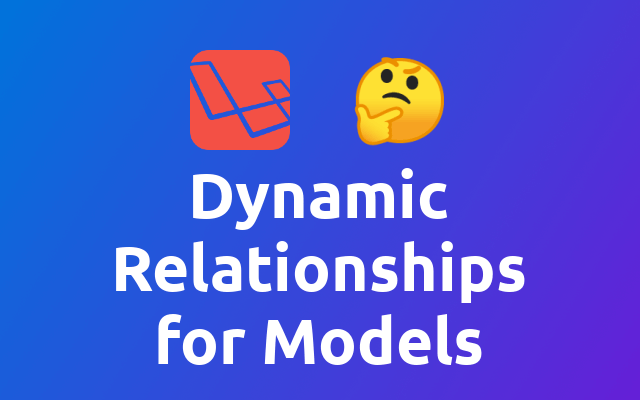Dynamic Relationships on Laravel Models

Learn how to add dynamic relationships on Laravel models.
Normally you can't extend a model without creating a lot of overhead. Also I learned the hard way, that it seems impossible to somehow use the Macroable trait on models ... 😞
But the following package can change all this with a similar approach, like the macroable trait uses.
This package will provide a simple trait for your model so you can then extend it in other places without having to touch the model. This makes it perfect for connecting models that are distributed over multiple packages.
The magic lays in the following trait.
<?php
namespace Rocky\Eloquent;
trait HasDynamicRelation
{
/**
* Store the relations
*
* @var array
*/
private static $dynamic_relations = [];
/**
* Add a new relation
*
* @param $name
* @param $closure
*/
public static function addDynamicRelation($name, $closure)
{
static::$dynamic_relations[$name] = $closure;
}
/**
* Determine if a relation exists in dynamic relationships list
*
* @param $name
*
* @return bool
*/
public static function hasDynamicRelation($name)
{
return array_key_exists($name, static::$dynamic_relations);
}
/**
* If the key exists in relations then
* return call to relation or else
* return the call to the parent
*
* @param $name
*
* @return mixed
*/
public function __get($name)
{
if (static::hasDynamicRelation($name)) {
// check the cache first
if ($this->relationLoaded($name)) {
return $this->relations[$name];
}
// load the relationship
return $this->getRelationshipFromMethod($name);
}
return parent::__get($name);
}
/**
* If the method exists in relations then
* return the relation or else
* return the call to the parent
*
* @param $name
* @param $arguments
*
* @return mixed
*/
public function __call($name, $arguments)
{
if (static::hasDynamicRelation($name)) {
return call_user_func(static::$dynamic_relations[$name], $this);
}
return parent::__call($name, $arguments);
}
}
You cann install the package through composer.
composer require i-rocky/eloquent-dynamic-relation
Then you can apply it to your model like so.
<?php
use Rocky\Eloquent\HasDynamicRelation;
// ...
class User extends Model
{
use HasDynamicRelation;
// ...
}
Then, for example in the service provider of your package, you can call the addDynamicRelation method to assign a new relationship method to the model.
User::addDynamicRelation('payments', function (User $User) {
return $User->hasMany(Payment::class);
});
And thats it! You have added the payments method on the User model. Nice right? 😁
